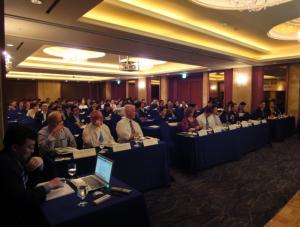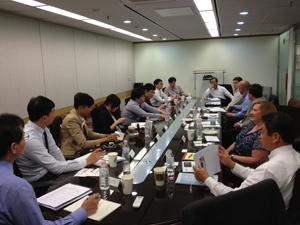“The American agricultural system is astounding. We will overproduce again, you can bank on it,” said Kelly Davis of the Renewable Fuels Association. During her presentation at a U.S. Grains Council organized conference in South Korea, Davis reassured longtime customers of the United States ability to produce enough for its three major markets: ethanol, domestic livestock and exports.
Earlier this week, Council staff and members, including Tate & Lyle, Valero, Ag Processing Inc., Blue Water Shipping Company and Purina Animal Nutrition, attended at the Asia Regional Co-Products Conference in Seoul, Korea. The first part of conference in Seoul was attended by more than 100 key representatives from Korean feed millers, distributers, and animal nutrition practitioners. The seminar will end in Tokyo, Japan, tomorrow.
While there were many questions and concerns raised at the conference, two topics formed a common theme: price and the large, but potentially late planting corn crop. South Korean buyers are among the most sophisticated in the world and feel they must diversify their sourcing. While current high prices for U.S. corn are severely constraining U.S. exports, there is still in Korea a premium assigned to U.S. corn. According to Kim Chi-Young of the Korean Feed Association, this premium had formerly been in the range of $2-3/metric ton but has recently reached $4-5/metric ton. Even with this premium, however, at current prices U.S. corn is still being undersold by South American producers. In terms of the possible late planting, there was a consensus among U.S. participants that of the 97 million acres projected to be put into production; only about two million could be lost. It is important to note that all U.S. participants were confident that the most productive land will be used for corn.
While in Korea, some of the team also met one-on-one with key importers and distributers and continued to educate them on U.S. coarse grains and co-products. From the conference and meetings, it is clear Korea is looking forward to a strong U.S. crop this year and the opportunity to continue its relationship with the U.S. agriculture sector.



